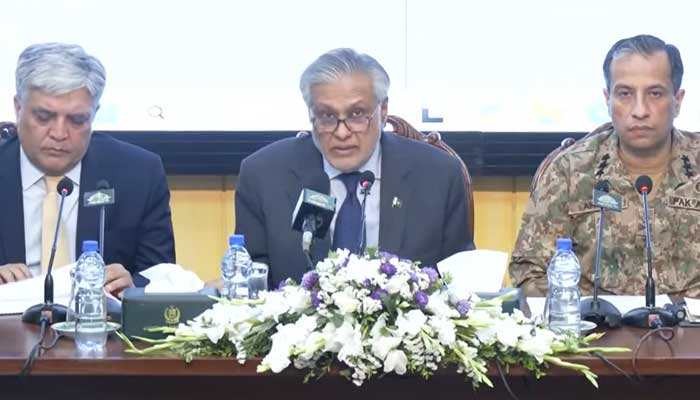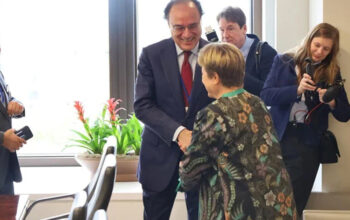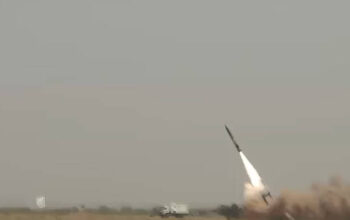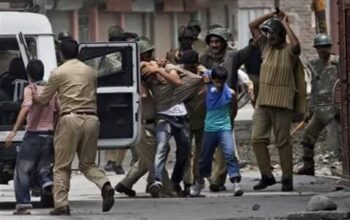By Staff Reporter
ISLAMABAD: Deputy Prime Minister Ishaq Dar said on Wednesday that Pakistan would not initiate military escalation with India but warned of a “very strong” response if provoked, as tensions over a deadly attack in occupied Kashmir brought the nuclear-armed rivals to a diplomatic precipice.
“… Pakistan will not be the first one to resort to any escalatory move. However, in case of any escalatory move by the Indian side, we will respond very strongly,” Dar said at a media briefing alongside military and foreign office officials.
The April 22 shooting in Pahalgam killed 26 men, the deadliest attack on civilians in the region in 25 years. Kashmir Resistance, also known as The Resistance Front, initially claimed responsibility but later denied its involvement.
India has implied cross-border linkages of the attackers without providing any evidence, a claim Pakistan has strongly rejected. Since the incident, the nuclear-armed nations have unleashed a raft of measures against each other. India suspended the Indus Waters Treaty on April 23, a key water-sharing pact.
Pakistan threatened to halt the Simla Agreement and close its airspace to Indian flights in retaliation. Prime Minister Shehbaz Sharif also pressed for a neutral probe into the attack.
The minister said the government and armed forces are alert to the possibility of any Indian military aggression.
“We are vigilant, our armed forces are vigilant and the nation will thwart any misadventure responding in a befitting and decisive manner at the time and place of our choosing.”
Dar condemned the “politically motivated and highly provocative environment being created by India,” accusing New Delhi of exploiting the tragedy to distract from its “decades-long state terrorism and oppression” in occupied Kashmir.
“Let me start by reiterating that Pakistan condemns terrorism in all its forms and manifestations. No cause or objective can justify taking the lives of innocent people. This is the national and Islamic policy: killing of a human being is tantamount to killing entire humanity as per the [Holy] Quran and saving a life is tantamount to saving entire humanity.”
Dar invoked the 2019 Pulwama attack, which New Delhi similarly weaponised to justify stripping Kashmir’s autonomy. “It is preposterous to even suggest any kind of association of Pakistan with this [Pahalgam] incident. We demand an independent and transparent probe by neutral investigators, as announced by Prime Minister Shehbaz Sharif,” he said. “India needs to explain why such incidents usually coincide with high-profile visits.”
The foreign minister also criticized India’s decision to suspend the Indus Waters Treaty, a decades-old agreement governing shared river resources, calling it “unilateral and illegal.”
“Holding in abeyance the Indus Waters Treaty is unilateral and illegal. There are no such provisions in the treaty; it cannot be amended or terminated without consensus,” Dar said. “Pakistan gave up three rivers in this treaty. I can hardly find a water distribution treaty in the world whereby, a part of dealing with the distribution of water, the rivers could have also been given up.”
Military spokesperson Lt. Gen. Ahmed Sharif Chaudhry presented maps of the attack site’s remote, mountainous terrain to challenge India’s allegations.
Chaudhry questioned how alleged Pakistan-based terrorists could have operated in such an area and cast doubt on the Indian police’s rapid filing of he incident report.
“If the allegation is that the Pakistan-based so-called terrorists did this incident, then you need to be cognizant of where it lies, how deep within [occupied Kashmir]. If you see the terrain, you will see it is quite hilly, it is not the sort of terrain that is friendly and not the sort of terrain where all-weather fair roads exist. It’s mostly [four-wheelers] that travel,” Chaudhry said, questioning how Indian police registered a First Information Report (FIR) within 10 minutes in an area 30 minutes from the nearest station.
The military spokesman tied India’s rhetoric to a broader pattern of “state-sponsored terrorism,” alleging coordination between Indian intelligence and anti-Pakistan militants. “We have credible intelligence that Indians post-Pahalgam have tasked all their proxies to undertake terrorist acts everywhere in Pakistan.”
The Balochistan Liberation Army’s (BLA), a separatist group, appeared on Indian TV after recent attacks. “This is terrorism that is being abetted and sponsored by India. Pakistan is the last bulwark standing against this scourge,” Chaudhry said.
Both officials condemned India’s “systematic Islamophobic narrative,” with Chaudhry noting the Pahalgam victims were sheltered by local Muslims.
“The tourists who came in taxis belonging to Muslims, they stayed in hotels owned by Muslims, they ate food cooked by Muslims … and after the attack, they were covered and protected by Muslims. The first person to die was Muslim,” he said. “Why is an effort being made to label the whole community of Indian Muslims as terrorists? Is this part of some agenda?”
Dar warned India’s “vitriolic, highly inflammatory discourse” risked pushing the region toward “disastrous consequences,” and urged global powers to intervene. “Any escalatory move can go to a direction which would be unsustainable not only for the two countries but the entire region. It is the responsibility of friends and regional actors to ensure India doesn’t make this mistake,” the minister said.
“Over 80,000 lives lost, $150 billion in economic losses—no country has suffered like Pakistan due to terrorism. Yet India glorifies its assassination campaigns. The world must distinguish between sympathies for victims and endorsing Indian belligerence.”
Dar emphasised Pakistan’s readiness to defend its sovereignty. “The nation is united. The message is loud and clear: In terms of our sovereignty and territorial integrity, there is no compromise. If provocation takes place, don’t blame us.”
Copyright © 2021 Independent Pakistan | All rights reserved




